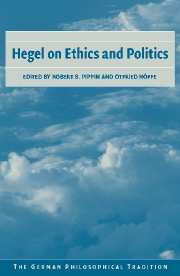Book contents
3 - Kant, Hegel, and the Contemporary Question Concerning the Normative Foundations of Morality and Right
Published online by Cambridge University Press: 14 July 2009
Summary
The Question at Issue
The challenging question that I want to address in the following is: “Kant or Hegel?” Of course, one might well respond in the spirit of contestation and ask: “Must it be a choice between Kant and Hegel? Do we not rather require a third option today?”
In a rather pedantic sense I must lay claim to this third possibility in terms of what I have myself projected as the “transformation of transcendental philosophy” – in relation to the problem of grounding norms. Yet I believe that the alternative posed in the question “Kant or Hegel?” is a useful way of opening up the kind of critical-reconstructive discussion that is indispensable for any contemporary attempt to articulate the normative foundations of ethics. And this will naturally be particularly true for the attempt to transform the tradition of transcendental philosophy, an attempt that must after all still remain centrally indebted to Kant.
For the sake of a preliminary historical orientation, I should like first to suggest the principal respects in which the Kant-Hegel debate also remains crucially relevant. At the same time, I should like to use this as an opportunity to outline the principal theses that will be explicated in part in the course of the following reflection:
First thesis: Any relevant contemporary transformation of transcendental philosophy must address all the essential aspects of Hegel's critique of Kant precisely in terms of the attempted transformation itself.
- Type
- Chapter
- Information
- Hegel on Ethics and Politics , pp. 49 - 78Publisher: Cambridge University PressPrint publication year: 2004
- 1
- Cited by



